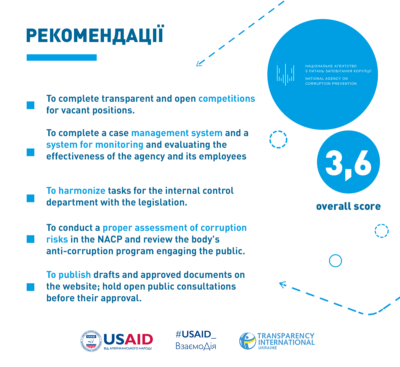

Transparency International Ukraine experts analyzed and assessed the implementation of recommendations to improve the level of capacity, management, and interaction of the National Agency on Corruption Prevention.
In October 2020, Transparency International Ukraine presented its first study of capacity, management, and interaction of agencies that make up Ukraine’s anti-corruption infrastructure. Based on the results of this study, we provided several recommendations for improving the work and efficiency of each of these bodies.
In the autumn of 2021, TI Ukraine experts analyzed the level of implementation of these recommendations by the National Agency on Corruption Prevention and other stakeholders.
The goal of this study is to provide a comprehensive assessment of the implementation of the recommendations that the NACP and other entities received in 2020 as part of the above-mentioned study.
The methodology of this study was based on the main approaches of the methodology of the National Integrity System, developed and implemented by Transparency International to assess the effectiveness of preventing and combating corruption within a particular country in the world.
The uniqueness of the study is that the researchers assessed several areas: resources, independence, transparency, accountability, and integrity of institutions.
During the analysis, the following sources were used: available official documents, including legislative acts, open sources of information (studies, reports, media articles, etc.) and information received on September 14, 2021, from the NACP in response to our request.
Research results
Last year, the NACP received an overall score — 3.3, where 1 is the lowest score and 5 is the highest. In 2020, TI Ukraine provided the National Agency with 34 recommendations to improve this indicator: 5 of them were priority and 29 were medium- and long-term recommendations. In the year following the presentation of the first study, none of the priority recommendations were fully implemented. The NACP managed to partially implement 4 priority recommendations out of 5, and the latter is still waiting to be implemented.
Among the other 29 non-priority recommendations, 7 were fully implemented (24%), 14 (48%) were partially implemented, and 8 (28%) remained unfulfilled.
Thus, the updated overall score of NACP’s capacity, management, and interaction as of September 20, 2021, amounts to 3.6 points, which is better than last year’s figure by 0.3. It can be noted that a year later, the NACP reached the level of the NABU in 2020, which also had 3.6 points as of October 2020. However, it is obvious that this year, the NABU has also improved its indicator, the specific updated value of which has not yet been set.
Based on the results of the analysis among the priority recommendations just like last year, it is worth highlighting the following:
- To complete transparent and open competitions for vacant positions.
- To complete a case management system and a system for monitoring and evaluating the effectiveness of the agency and its employees;
- To harmonize tasks for the internal control department with the legislation.
- To conduct a proper assessment of corruption risks in the NACP and review the body’s anti-corruption program engaging the public.
- To publish drafts and approved documents on the website; hold open public consultations before their approval.
We hope that those recommendations that have not been fully implemented to some extent will still be considered in the future in the process of developing such an important anti-corruption infrastructure body as the NACP.
You can access the full version of the study on the Ukrainian version below.
The purpose of the study of the capacity, management, and interaction of anti-corruption infrastructure bodies, published in 2020, was providing a comprehensive assessment of the institutional and operational capabilities of the main anti-corruption bodies of Ukraine — the NABU, the SAPO, the HACC, the NACP, and the ARMA.
This study covered the entire system of state and non-state stakeholders of the above-mentioned bodies of the anti-corruption infrastructure of Ukraine for the period from January 2015 to August 1, 2020, and contained an assessment of the capacity, management, and interaction of bodies in three directions:
- overall capacity of the institution;
- internal governance in terms of integrity, transparency, and accountability;
- cooperation of the body with state and non-state actors (state bodies, civil society, foreign partner bodies, international partners, etc.).
According to the results of the study, a report with several recommendations was published to improve the work and efficiency of anti-corruption infrastructure bodies, including the NACP.
This material was made possible by the support of the American people through the United States Agency for International Development (USAID). The content of this study is the sole responsibility of Transparency International Ukraine and does not necessarily reflect the views of USAID or the United States Government.







